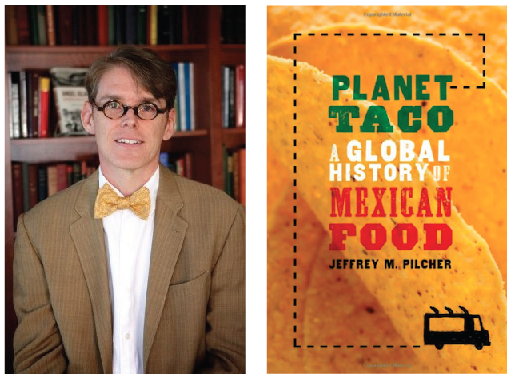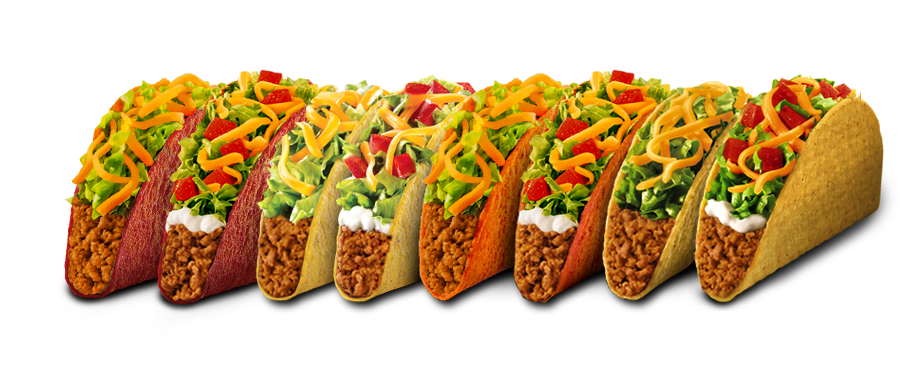The taco — a staple on any Tex-Mex or Mexican menu — has not been around for as long as you may think. According to Dr. Jeffrey M. Pilcher, an author and professor of history at the University of Toronto who brought his lecture Planet Taco: A Global History of Mexican Food to the University of Houston last Friday (Sept. 5), the taco was as much a product of modernization in Mexico as the Americanized versions were in the United States.
Pilcher’s appearance at the UH Honors College Commons was part of the Food for Thought Lecture Series, which is sponsored by the Gulf Coast Food Project, an organization that promotes the scholarly study of food in the Gulf Coast region. It was founded in 2008 by the Center for Public History, which is housed in the College of Liberal Arts and Social Sciences, and is also supported by the Jack J. Valenti School of Communication.
Along with his book Planet Taco: A Global History of Mexican Food, Pilcher is the author of several books on Mexican food, including Que Vivan los Tamales! Food and the Making of Mexican Identity and The Sausage Rebellion: Public Health, Private Enterprise and Meat in Mexico City.
During his recent UH lecture, Pilcher discussed the origins of the taco in Mexico and their worldwide popularity, as well as the role that authenticity plays in enjoying Mexican food.
According to Pilcher, while Mexico City was undergoing industrialization in the late 19th and early 20th centuries, it became the the hub of the modern-day taco. People flooded in from all over Mexico, and Mexico City taco shops became places to explore the diverse regional cuisines of the country.
Mexican food spread to the U.S. in the 20th century, but in the first half of the century it could only be found in the Southwest. In San Antonio, “chili queens” sold Mexican food in plazas downtown and contributed to the notion that Mexican food was dangerous, exotic and alluring. They were a tourist attraction as well as a local favorite, but they were eventually shut down in the 1940s for unsanitary practices.
The spread of Mexican food worldwide is not the work of Mexico, according to Pilcher. In fact, the U.S. has globalized Mexican food into what we now refer to as Tex-Mex. Pilcher attributes the globalization of Tex-Mex to two groups in particular: military personnel and surfers, both of which travel widely.
Pilcher also pointed out that the common hard taco shell is an American revamping of the traditional soft Mexican corn tortilla. Its invention is typically attributed to Glen Bell, founder of Taco Bell.
When discussing authenticity in Mexican food, Pilcher believes that “Is this authentic?” is the wrong question to ask. He places more importance (and we have to agree) on how good his fajitas, tacos or, depending on his mood that day, nachos taste.
Pilcher is one of six lecturers to have participated in the Gulf Coast Food Project‘s Food for Thought Lecture Series.
Since its founding, the Gulf Coast Food Project has sponsored numerous food-centric projects like film screenings and festivals, UH classes that study foodways and the ongoing Food for Thought lecture series, which is co-directed by Todd Romero (UH associate professor of history), Monica Perales (UH associate professor of history) and Temple Northup (UH assistant professor of media production at the Jack J. Valenti School of Communication).
Earlier this year, the project was awarded a $100,000 grant from the National Endowment for the Humanities. The money is going to be used to develop new food studies courses and a new interdisciplinary minor in Food Studies for both undergraduate and graduate students. Outside of UH and the National Endowment for the Humanities, the Gulf Coast Food Project is also supported by Foodways Texas, the El Paso Lecture Series, the Association for Education in Journalism and Mass Communication, The Knight Foundation and Humanities Texas.
For more information on the Gulf Coast Food Project and the Food for Thought Lecture Series, visit www.uh.edu/gcfp.








Follow Us